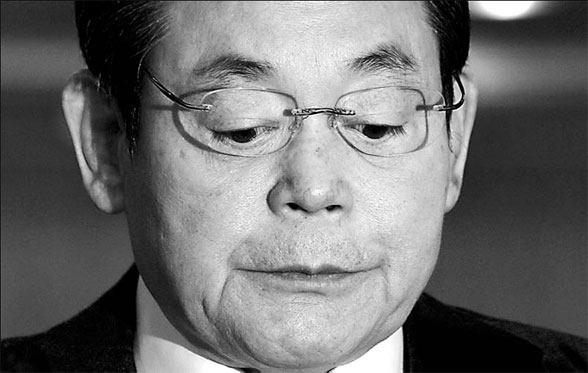'I am truly sorry', says Samsung's Lee
|
Samsung Group Chairman Lee Kun-hee reacts during a news conference on his resignation in Seoul. Reuters |
Samsung Group Chairman Lee Kun-hee will step down after being charged with tax evasion and breach of duty, ending his two-decade reign over South Korea's largest industrial group.
Vice-Chairman Lee Hak-soo and President Kim In-joo will also resign by the end of June, Samsung said in a statement yesterday. The strategic planning office that coordinates the group will be dismantled and Samsung may transform itself into a holding company structure, it said. The chairman's son, Lee Jae-yong, will be reassigned overseas, it said.
The resignations create a vacuum atop a business empire whose 59 units include Samsung Electronics, Asia's largest maker of mobile phones, chips and televisions. Lee's departure will leave Samsung under professional management, undermining the family-run chaebol model that's symbolized South Korea's corporate landscape for more than 40 years.
Lee's departure signals "an end to the era of the Masters of the Universe", said Tom Coyner, who helps advise foreign investors in South Korea as president of Soft Landing Consulting Ltd in Seoul. "The resignation by Chairman Lee Kun-hee is unprecedented."
Lee, 66, was charged last week by prosecutors with evading 112.8 billion won ($113 million) of taxes and with breach of fiduciary duty for causing losses at Samsung by helping his son gain control of group units. The probe began in January after Samsung's former chief lawyer, Kim Yong Chul, alleged that the group diverted funds for bribery.
'Truly sorry'
"I'm truly sorry for causing so much concern with the investigation," Chairman Lee, who has neither admitted nor denied the allegations, said in a televised press briefing. "I will assume full legal and moral responsibility."
Lee was convicted in 1996 for bribing ex-Presidents Chun Doo-hwan and Roh Tae-woo, drawing a two-year prison term, suspended for three years. He was pardoned by President Kim Young-sam a year later.
The chairman took the helm in 1987 after the death of his father, Lee Byung-chull, who founded Samsung as a four-story wooden store selling groceries in the southern city of Daegu in 1938, when Korea was under Japanese occupation.
By 2006, Samsung Group's revenue jumped ninefold over two decades to $159 billion, representing about 18 percent of the nation's gross domestic product, according to the company's latest consolidated figures. Its 2006 exports totaled $70 billion, making up 21 percent of the country's total exports.
'Shocking' plan
Samsung's reform plan is "shocking", the Federation of Korean Industries, which represents the nation's biggest industrial groups, said in a statement on its website.
Separately, Vice-Chairman Lee Hak Soo denied speculation that Samsung Group would move into the country's banking industry.
South Korea's financial regulator is revising rules to allow industrial groups to own more than 4 percent stake in nationwide banks after President Lee Myung-bak promised to lift restrictions. Woori Finance Holdings Co, the nation's third-largest financial service company, and Korea Development Bank are among a list of privatization targets by the government.
Not everyone's convinced about the extent of Samsung's reforms.
"We hardly believe there will be any real improvement in the group's corporate governance," the Solidarity for Economic Reform, a Seoul-based civic group, said in an e-mailed statement.
Prosecutors in 2005 had investigated whether Lee and other company executives used corporate funds to pay presidential candidates. Although cleared, Lee apologized and pledged to donate 590 billion won of his and his family's wealth.
"People hadn't expected Lee Kun-hee to go as far as stepping down but the resignation won't really hurt the company," said Kim Hyung-chan, who oversees the equivalent of $800 million at KTB Asset Management Co in Seoul, including shares of Samsung Group companies. "The reform plan sounded too academic, without enough detail about what they'll do about corporate governance."
Agencies
(China Daily 04/23/2008 page16)









